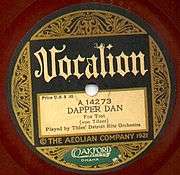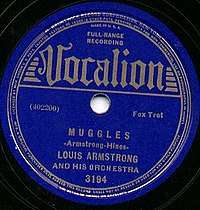Vocalion Records
For Decca's Vocalion label, see Disques Vogue
| Vocalion Records | |
|---|---|
 1921 Vocalion label | |
| Founded | 1916 |
| Founder | Aeolian Piano Company |
| Genre | Jazz |
| Country of origin | U.S., U.K. |
Vocalion Records is an American record company and label active for many years in the U.S. and the U.K.
History
Vocalion (pronounced "vo-CAL-yun") was founded in 1916 by the Aeolian Piano Company of New York City, which introduced a retail line of phonographs at the same time. The name was derived from one of their corporate divisions, the Vocalion Organ Company. The label issued single-sided, vertical-cut disc records but switched to double-sided. In 1920 it switched to the more common lateral-cut system.
In 1925 the label was acquired by Brunswick Records. During the 1920s Vocalion also began the 1000 race series, records recorded by and marketed to African Americans.[1]

In April 1930, Warner Bros. bought Brunswick Records and. In December 1931 Warner Bros. licensed the entire Brunswick and Vocalion operation to the American Record Corporation. ARC used Brunswick as their flagship 75-cent label and Vocalion as one of their 35-cent labels. New signings (Dick Himber, Clarence Williams, Leroy Carr) contributed to the growing popularity of the label.
Starting in about 1935, Vocalion became even more popular with the signing of Billie Holiday, Mildred Bailey, Stuff Smith, Putney Dandridge, and Red Allen. Coupled with other short-term signings, including Fletcher Henderson, Phil Harris, Earl Hines, and Isham Jones, and their healthy Race and Country releases made Vocalion a powerhouse presence.
In 1935, Vocalion started reissuing titles that were still selling from the recently discontinued OKeh label. In 1936 and 1937 Vocalion produced the only recordings by blues guitarist Robert Johnson (as part of their ongoing field recording of blues, gospel and "out of town" jazz groups). From 1935 through 1940, Vocalion was one of the most popular labels for small-group swing, blues, and country. After the short-lived Variety label was discontinued (in late 1937), many titles were reissued on Vocalion, and the label continued to release new recordings made by Master/Variety artists through 1940. This added Cab Calloway and the Duke Ellington small groups-within-his-band (Rex Stewart, Johnny Hodges, Barney Bigard and Cootie Williams) to the label.
ARC was purchased by CBS and Vocalion became a subsidiary of Columbia Records in 1938. The popular Vocalion label was discontinued in 1940. The discontinuance of Vocalion (along with Brunswick in favor of the revived Columbia label) voided the lease arrangement Warner Bros. had made with ARC in late 1931. In a complicated move, Warner Bros. got the two labels back and promptly sold them to Decca, but CBS retained control of the post-1931 Brunswick and Vocalion masters.
The name Vocalion was resurrected in the late 1950s by Decca (US) as a budget label for back-catalog reissues. This incarnation of Vocalion ceased operations in 1973; however, its replacement as MCA's budget imprint, Coral Records, kept many Vocalion titles in print. In 1975, MCA reissued five albums on the Vocalion label.[2]
In the UK, Decca used the Vocalion label mainly to issue US artists, replacing its Vogue label, the rights to whose name had reverted to the French Disques Vogue.
In 1997 the Vocalion brand was brought back for a new series of compact discs produced by Michael Dutton, of Dutton Laboratories, in Watford, England. This label specializes in sonic refurbishments of recordings made between the 1920s and the 1970s, often leasing master recordings made by Decca and EMI.
Notable recordings
- "Pinetop's Boogie Woogie" by Pinetop Smith, Vocalion 1245 (1928)
- "How Long, How Long Blues" by Leroy Carr, Vocalion 1191 (1928)
- "Sensational Mood" by Lloyd Hunter's Serenaders with Victoria Spivey, Vocalion 1621 (1931)
- "Rising Sun Blues" by Clarence Ashley and Gwen Foster, Vocalion 2576 (1933)[3]
- "I Want to Be a Cowboy's Sweetheart" by Patsy Montana, Vocalion 3010 (1935)
- "Let Yourself Go" by Bunny Berigan and His Boys, Vocalion 3178, recorded on February 24, 1936
- "I Can't Get Started" by Bunny Berigan and His Boys, Vocalion 3225, recorded on April 13, 1936
- "Did I Remember?" b/w "No Regrets" by Billie Holiday, Vocalion 3276, recorded on July 10, 1936
- "Summertime" b/w "Billie's Blues" by Billie Holiday, Vocalion 3288, recorded on July 10, 1936
- "A Fine Romance" by Billie Holiday, Vocalion 3333, recorded on September 29, 1936
- "Cross Road Blues" by Robert Johnson, Vocalion 3519 (1936)[4]
- "I've Got My Love To Keep Me Warm" by Billie Holiday, Vocalion 3440, recorded on January 12, 1937
- "Trust in Me" b/w "My Last Affair" by Mildred Bailey, Vocalion 3449 (1937)
- "Where Are You?" by Mildred Bailey, Vocalion 3456 (1937)
- "Doin' the Jive" b/w "Dipper Mouth Blues" by Glenn Miller and his Orchestra, Vocalion 5131 (1937, released 1939)
- "You Go To My Head" by Billie Holiday, Vocalion 4126, recorded on May 11, 1938
- "So Help Me" by Mildred Bailey, Vocalion 4253 (1938)
- "The Very Thought of You" by Billie Holiday, Vocalion 4457, recorded on September 15, 1938
See also
References
- ↑ Archived February 8, 2007, at the Wayback Machine.
- ↑ "Vocalion Album Discography". Bsnpubs.com. 2014-04-27. Retrieved 2014-08-04.
- ↑ "Peter Seeger: American Favorite Ballads : Liner Notes" (PDF). Media.smithsonianfolkways.org. Retrieved 2014-08-04.
- ↑ "GRAMMY Hall Of Fame". GRAMMY.org. Retrieved 2014-08-04.